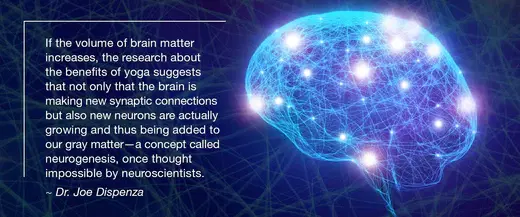Yoga:
Good For the Body and the Brain
Dr Joe Dispenza | 03 March 2017
It’s commonly known that yoga is good for your body. Combining postures, breathing, and meditation, it only takes a few sessions to see how quickly it can tighten muscles, increase flexibility, and reduce stress. But what effects does yoga have on the brain? New research by Chantal Villemure and Catherine Bushnell of the National Center for Complementary and Alternative Medicine in Bethesda, Maryland, suggest that it actually helps grow parts of your brain.
To conduct the study, Villemure used MRI (magnetic resonance imagining) scans to compare people who regularly practiced yoga with control subjects. On average, the yogis involved in the study dedicated about 70 percent of their practice to physical postures, about 20 percent to meditation, and 10 percent to breath work, which is typical of most Western yoga routines. Over all, the results showed an increase in gray matter (brain cells) in certain areas of the brain of the regular yoga practitioners versus the control subjects.
“We found that with more hours of practice per week, certain areas were more enlarged,” Villemure says, hinting at the fact that yoga was a contributing factor to the brain gains.
Specifically, the study showed larger brain volume in the somatosensory cortex of the yogis, which contains a mental map of our body, the superior parietal cortex, involved in directing attention, and the visual cortex, which Villemure believes may have been bolstered by visualization techniques. The hippocampus, a region critical to making new memories, was also enlarged in practitioners. Other areas key to our concept of self, such as the precuneus and the posterior cingulate cortex, also gained volume. Villemure believes all these areas of the brain could be engaged by elements of yoga practice.
If the volume of brain matter increases, the research about the benefits of yoga suggests that not only that the brain is making new synaptic connections but also new neurons are actually growing and thus being added to our gray matter—a concept called neurogenesis, once thought impossible by neuroscientists.
In another study published in the Journal of Physical Activity and Health, researchers found that compared to aerobic exercise, after just 20 minutes of Hatha yoga people did better on brain functioning tests in both speed and accuracy.
For the study, 30 female college students underwent 20 minutes of yoga followed by meditation and deep breathing, as well as 20 minutes of aerobic exercise (jogging on a treadmill). Researchers had the participants perform cognitive testing after both the yoga session and after the aerobic exercise session. What they found was that the test scores were better after the yoga session.
“It appears that following yoga practice, the participants were better able to focus their mental resources, process information quickly, more accurately, and also learn, hold, and update pieces of information more effectively than after performing an aerobic exercise bout,” said study researcher Neha Gothe, a professor of kinesiology, health, and sport studies at the University of Illinois at Urbana-Champaign.
“Enhanced self-awareness that comes with meditational exercises is just one of the possible mechanisms,” Gothe said in the statement. “Besides, meditation and breathing exercises are known to reduce anxiety and stress, which in turn can improve scores on some cognitive tests.”
There you have it. Proof of what you probably already knew to be true—yoga does the body as well as the mind good. Ancient cultures who practiced yoga and then passed down the principles to following generations knew it was one of the best forms of medicine. And the best part about it is that you don’t need a gym, weights, running shoes or anything outside of you to do it. So try it out, the worst thing that can happen to you is that you grow a bigger brain which works better.

Comments